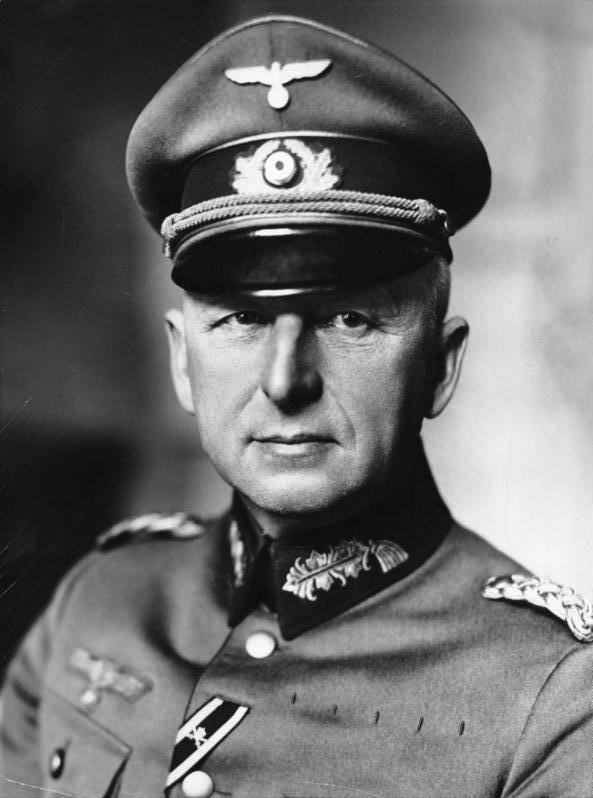Post by Jean Lannes on May 1, 2016 4:32:45 GMT
This lecture will be about the Iranian coup in 1953 and the foreign involvement. I know this is a very controversial topic so I ask Mountbatten to lock it if a flame war is threatning to start. I ask everybody to stay as neutral as possible and I will try the same with this too. Note that I will be using Iran instead of Persia to keep everything simple.
We start in 1908, oil has just been found on Iranian land and the British, always trying to get more power, quickly find out the nation is a huge supply of natural resources. The Anglo-Iranian Oil Company is established and through deals with the government of Iran owns most of the oil fields in the nation. Many people in Iran see the deals negatively though arguing that Iran's government gets very little amount of the revenue. Sometimes the government would only get 16% (!) of the money from the sold Iranian oil.
One of the many enemies of the British control over Iranian oil is the famous lawyer and nationalist Mohammed Mossadegh who became PM (Prime Minister) in 1951 through a democratic election. Iran was ruled by Mohammed Reza Pahlavi the last one to be Shah of Iran.
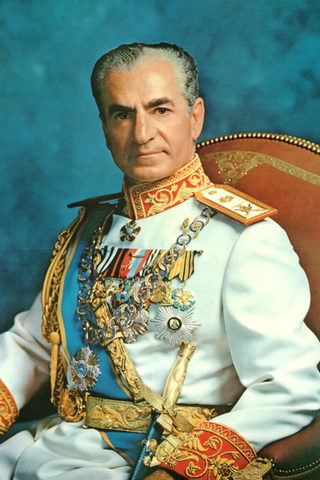
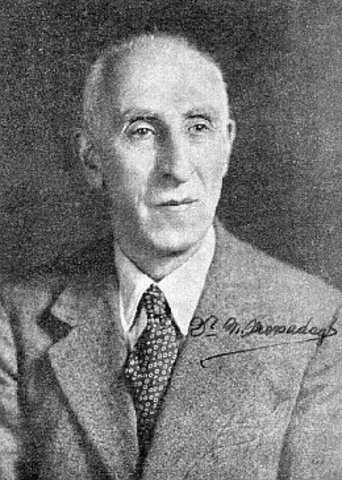
Above: Mohammed Reza Pahlavi
Below: Mohammed Mossadegh
Mossadegh was known to be very anti imperialistic and also uncorruptable. He promised to nationalize the oil fields in British hands. Mossadegh had relatives in the Qajar dynasty and played an important role in Iranian history for decades. Demonstrations broke out in Abadan after the nationalizitation of multiple oil fields and the flags of companies were teared down while the Iranian flag was raised.

Raising the Iranian flag in Abadan
Mossadegh was special as in that never before has the leader of a weak nation faced a global power like Mossadegh did, nobody stood up and said something like "These resources are ours whatever your companies agreed on, whichever treaties you forced on us, it was unjust, these are our resources, we are horribly poor and need the money, and we insist on having it." Mossadegh wasn't just a nationalist leader but also a defender of a liberal democracy, the Time magazine made Mohammed Mossadegh the Man of the Year 1951.

Many Iranians supported the nationalization of the oil and attacking the Anglo-Iranian Oil Company saying that they wanted 50% of the income and see the audits as even the Iranian government couldn't see them. The oil company refused, alone thinking that a poor nation could force them to do something was unthinkable. Mossadegh pretty much argued that Iran wanted to decide how much oil to get and who to sell it to. Another issue was that the UK and the USA didn't want other nations in the Middle East doing the same thing. The British were ready for compromises but secretly wanted to keep everything, they started building parks and swimming pools. By 1951 the British claimed that the Iranians should thank the British for the swimming pools and parks but a swimming pool would maybe cost 2,000£ while the oil was bringing in 50,000 million a year. The British didn't exactly know how to react to this, the first thought was sending an army and occupying Iran. When US President Harry Truman heard of that he was enraged.
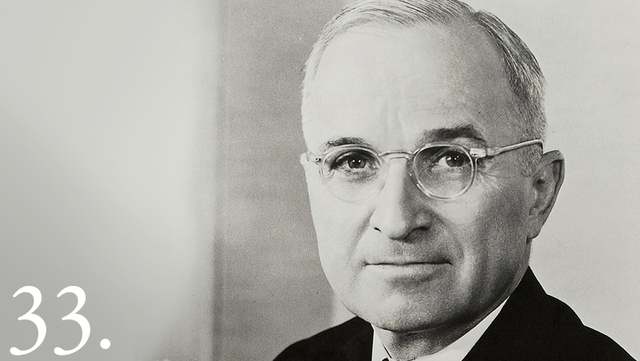
Harry S. Truman 33th President of the USA
Truman said no because to him it sounded imperialistic and colonialistic. Truman send the governer of New York to Iran, he should talk to Mossadegh and try to get to a compromise, he failed. The British plan in the beginning was to weaken Iran by economical pressure. They tried to stop the oil industry but the Iranians were able to use the oil fields. The next step was a blockade so Iran couldn't sell its oil, whenever ships from Italy or elsewhere came they were confiscated by the British.
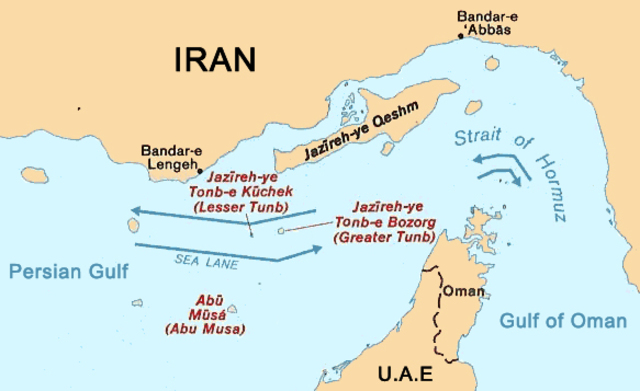
Strait of Hormuz, an important trading point in Iran and the Middle East.
After that the British tried it with international law. First a resolution at the UN, when Mossadegh heard about it he did something what no leader of a poor nation ever did, he flew to New York and personally presented his position. His visit created a lot sensation. Flying to New York wasn't that easy for Mossadegh either but he was able to visit a lot of place in the North Eastern USA.
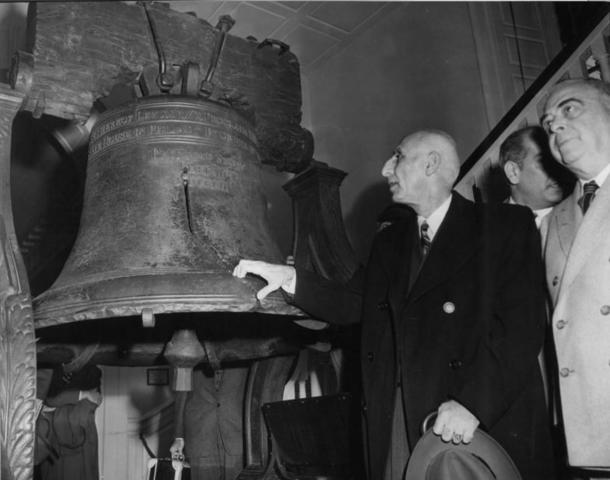
Mossadegh visiting the Liberty Bell in Philadelphia
Mossadegh's speech in front of the security council was very impressing to many. People in the UN and around the world were surprised to hear the other side of a story as well.

Mossadegh speaking in front of the UN Security Council
After the debate the UN Security Council did something that in its short life time hadn't happen yet. It refused the resolution by the UK which was one of the leading members of the Security Council. Now the UK brought Mossadegh to the International Court in The Hague. Mossadegh personally flew there and was able to do the same again. Mossadegh left a strong impression and the judges refused to force him to give back the oil industry. The UK was running out of options from the British point of view the Iranians had stolen something from them while in the Iranian view they were taking back what they said was their own. The British tried to overthrow Mossadegh by bribing Iranian parliament leaders but Mossadegh found out about it and threw the British out of Iran.
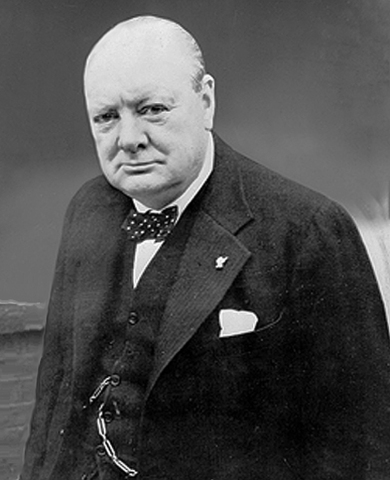
Winston Churchill, PM of the UK at that time
After the British embassy was kicked out of Iran following the failed overthrow the British had tried everything from going to court up to threats. So they asked the Americans, Harry Truman was completely against the idea of an overthrow of a democratically elected Prime Minister and the British tried hard to convince him. The CIA had not overthrown a government yet and Truman wanted it to stay that way. For the British this seemed like the end, but then in November 1952 there was new hope for the British. The USA elected a new president, Eisenhower who was much more pro overthrow of Mossadegh than Truman especially because Eisenhower hated war and he saw an overthrow as better choice than waging war againt Iran.
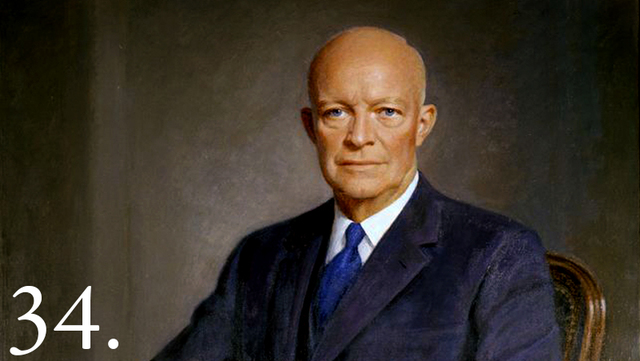
President Dwight D. Eisenhower, 34th President of the USA
The British came again and asked for help in overthrowing Mossadegh. John Foster Dulles, Eisenhower's Secretary of State was an enemy of Communism, he spent much of his life as lawyer for international corporations. His brother Allen became the new director of the CIA (Central Intelligence Agency), it was the first and only time that two brothers decided both the secret and official US foreign policy. For the British it was easy to convince the brothers to support an overthrow of Mossadegh. The brothers then convinced Eisenhower by using his fear of Communism spreading. There was only one person in the Eisenhower's government who was interested in what Mossadegh said and that was Eisenhower himself.

Allen (l.) and John Dulles.
During a meeting Eisenhower said "I am happy if we overthrow this Communist Mossadegh, but I'm not sure if he actually is a Communist." Dulles had a brilliant answer to that, he said "Well, it's true that Mossadegh is no Communist but he is an old man he could die or be overthrown, the result could be instability in Iran, there's a Communist party in Iran and the country has a border to the Soviet Union..." Eisenhower was convinced and he approved it. There was another reason for Eisenhower as well, he hated war and he especially didn't want a nuclear war so he preferred secret operations because compared to a war, they were cheaper.

Iran's main cities and geographic location. In the North it bordered the Soviet Union.
After the plan to overthrow Mossadegh was approved, the USA decided on Kermit Roosevelt to carry out the coup. Kermit Roosevelt was the grandson of Theodore "Teddy" Roosevelt. As boss of the CIA division Middle East was he the first choice, he was perfect for the operation and he wanted to serve his country but in a hidden way.
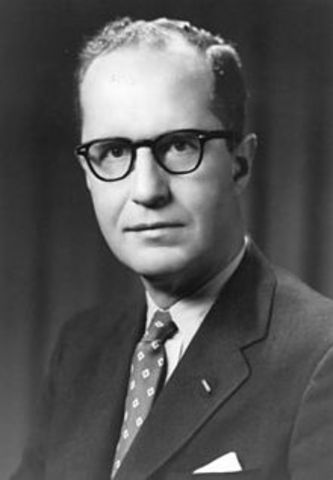
Kermit Roosevelt Jr.
In the beginning of August 1953, Kermit Roosevelt arrived in Tehran and Operation AJAX* began. Roosevelt bribed tribe leaders and journalists which now claimed Mossadegh was a dictator which he clearly wasn't. They claimed many things about him such as him being a Jew (which was viewed negatively), homosexual (also viewed negatively), a criminal, a spy of the British (which is ironic), anything that could weaken him. Roosevelt went sure by also bribing officers from the army, religious leaders, and parliament members. Roosevelt also decided that he would lead Tehran sink in chaos, he thought that if there'd be unrest in Tehran everyday the people would think that Mossadegh can't control the country anymore. With the day of the coup coming closer Roosevelt bribed a famous Tehrani gangster boss called Shaban Jafari also called Shaban the Brainless to send out his men.
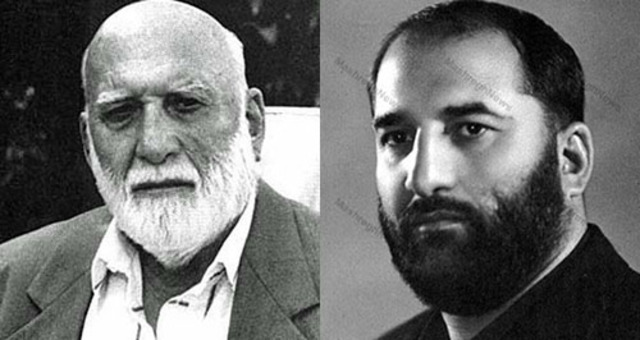
Shaban the Brainless old and young.
Roosevelt's plan was that the gansgsters would run through the streets, beat up civilians, light up fires on mosques, destroy small businesses, and yell "Up with Communism, we love Mossadegh." As if that wasn't enough, Roosevelt bribed a second group that should attack the first one leading to violence across Tehran and a lot of chaos. First however Roosevelt included the Shah who was somewhat of a coward he was very scared of being part of the operation because he feared that if it should fail he won't be able to enter Iran anymore. The Shah himself said it won't work, they had to first send his sister to Iran to convince the Shah. Roosevelt's idea was that the Shah should sign two decrees, the first being the decree to dismiss Mossadegh as PM and the second one making General Zahedi the new PM.
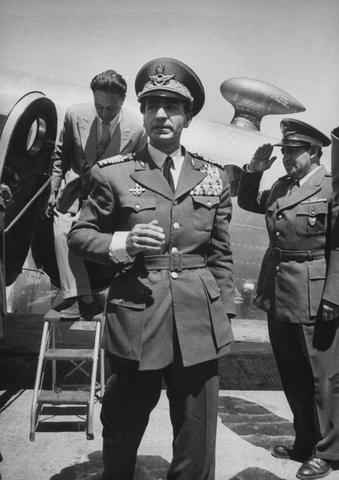
The Shah returning to Iran in August 1953.
The plan was that around midnight a colonel loyal to the Shah should, with his soldiers, arrive at Mossadegh's house. Everybody knew Mossadegh would say no because the Shah can't dismiss the PM without parliament's approval and in that moment Mossadegh should be arrested. This simple plan failed because Mossadegh heard of it and when the soldiers came to arrest him Mossadegh already had a bigger army in his house who then arrested the Shah's colonel.
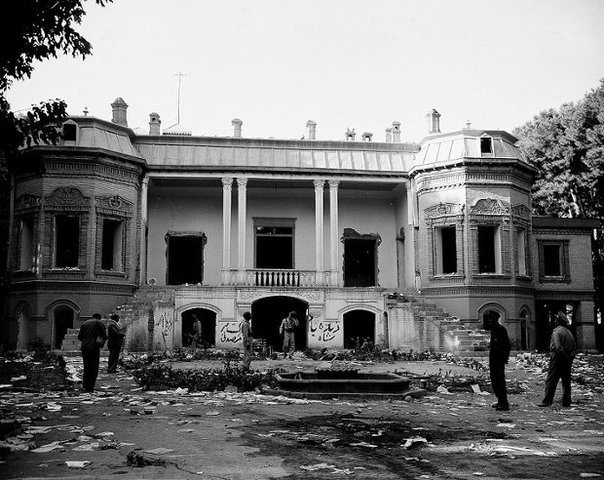
Mossadegh's house after the coup
The next morning Radio Tehran announced that a coup by the British had been crushed. The Shah instantly left the country, first to Baghdad and then to Rome. The CIA send a telegraph to Roosevelt that the situation was too dangerous and that he had to leave Tehran instantly, Kermit Roosevelt however wanted to try again. He decided to stay in Tehran and four days later tried to stage another coup. In the next days Roosevelt put Tehran into more and more chaos. Numerous mobs demonstrated for the Shah, when some mullas spoke against Mossadegh, he led the military march. Nobody could've known that it was Kermit Roosevelt in the US embassy. When two Iranians working for the CIA threatened to leave Roosevelt offered them a deal, he put $50,000 in a little bag and told them that if they continue helping him they get the money, if they don't he would kill them, logically they decided to continue helping.

Chaos in Tehran
Roosevelt still had enough bribed officers and on August 19th over the U.S. ambassador he led Mossadegh get a message from him. Mossadegh should control the nation or the USA won't recognize him being the PM anymore. The ambassador wrongly claimed that the life of Americans was in danger and Mossadegh fell into the trap. He withdrew his guys from the streets and allowed martial law allowing the conspirators access to weapons and fuel. The officers then went with their tanks to Tehran, not to empty the streets full of demonstrators but rather arrest Mossadegh. At Mossadegh's house the battle was fought, his three tanks had no chance against the many officers. Mossadegh's house was destroyed. Finally, late at night, there was no more shooting and the people ran away. Messaged himself jumped over a fence and escaped. The house was looted, some of Mossadegh's furniture sold on the streets including someone buying his refrigerator for $35.

Mossadegh's house being looted
It was time for the coup de grâce, the approval of Zahedi. General Zahedi served WW2 in a British internment camp due to relations with Nazi spies. Roosevelt and Zahedi were hiding very close to the American embassy while this was going on. After some time Roosevelt went to Zahedi and said to him that everything is alright, he's becoming PM now, Zahedi was waiting in underwear for news. Zahedi was brought out to the streets and was driven on a tank through Tehran to give a speech on the radio saying that he was the new Prime Minister now. There was one problem, when Zahedi wanted to start the moderator said that they needed fitting music to show that the Iranian patriotism finally won. So Roosevelt ran to the library of the embassy, took the first plate he found and played it. The first thing that played was the American anthem, quickly the music was changed and Zahedi held his speech.
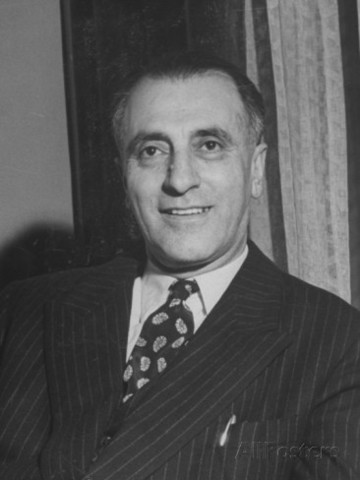
General Fazlollah Zahedi
At that time the Shah was eating in Rome and asked himself what he should do he already told people he'd be searching for work since he couldn't go back to Iran. Suddenly a few reporters came in and told him about the successful coup, the Shah was shocked and speechless his first words then were "I knew it, they love me." After the coup hundreds of officers were arrested and around 60 executed, the cleaning was against every officer who stood loyal to the democratic government. For the support in the coup the CIA paid Zahedi 5 million dollar. The access to the oil industry was brought back, American companies now held 40% of the profits and Iran should get 50% but the British took over all the control again and the oil company was renamed into BP (British Petroleum). Three months after the coup faced martial law for treason and was sentenced to 3 years in prison.
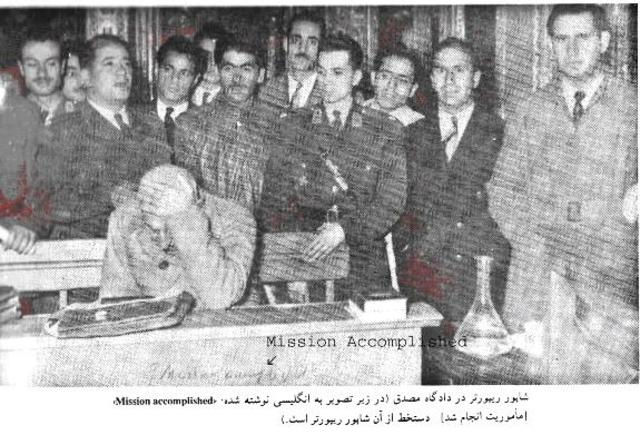
Mossadegh facing martial law. The man in the rain coat is Tehran's MI6 station chief Shapur Jay, he also wrote the "Mission Accomplished"
The Soviets had no plan for Iran in the years 1951-1954 but also the Communist party in Iran at that time, the Tudeh Party was more of a local political group not one from the Soviet Union. Often brought in connection with the Cold War the Abadan Crisis had more to do with the British oil than the Soviet Union or Communism. Latter was used as reason for the overthrow of a democratically elected government. During the attack on Mossadegh's house around 300 people had died and many more were wounded. The coup was used as example in the following year in Guatemala for example. Some things weren't part of the CIA report such as the fact that they worked closely with the Iranian Nazi party or the murders the MI6 and the CIA were involved in.
After 25 years of the Shah ruling, radical Islamists took over control and under Ayatollah Khameini put in a theocratic government still controlling Iran to this very day. The coup pretty much backfired 25 years later when the Iranian embassy was stormed by Iranian demonstrators and it lead to the Iran hostage crisis and then in the 80s to the Iran Contra Affair.
We start in 1908, oil has just been found on Iranian land and the British, always trying to get more power, quickly find out the nation is a huge supply of natural resources. The Anglo-Iranian Oil Company is established and through deals with the government of Iran owns most of the oil fields in the nation. Many people in Iran see the deals negatively though arguing that Iran's government gets very little amount of the revenue. Sometimes the government would only get 16% (!) of the money from the sold Iranian oil.
One of the many enemies of the British control over Iranian oil is the famous lawyer and nationalist Mohammed Mossadegh who became PM (Prime Minister) in 1951 through a democratic election. Iran was ruled by Mohammed Reza Pahlavi the last one to be Shah of Iran.


Above: Mohammed Reza Pahlavi
Below: Mohammed Mossadegh
Mossadegh was known to be very anti imperialistic and also uncorruptable. He promised to nationalize the oil fields in British hands. Mossadegh had relatives in the Qajar dynasty and played an important role in Iranian history for decades. Demonstrations broke out in Abadan after the nationalizitation of multiple oil fields and the flags of companies were teared down while the Iranian flag was raised.

Raising the Iranian flag in Abadan
Mossadegh was special as in that never before has the leader of a weak nation faced a global power like Mossadegh did, nobody stood up and said something like "These resources are ours whatever your companies agreed on, whichever treaties you forced on us, it was unjust, these are our resources, we are horribly poor and need the money, and we insist on having it." Mossadegh wasn't just a nationalist leader but also a defender of a liberal democracy, the Time magazine made Mohammed Mossadegh the Man of the Year 1951.

Many Iranians supported the nationalization of the oil and attacking the Anglo-Iranian Oil Company saying that they wanted 50% of the income and see the audits as even the Iranian government couldn't see them. The oil company refused, alone thinking that a poor nation could force them to do something was unthinkable. Mossadegh pretty much argued that Iran wanted to decide how much oil to get and who to sell it to. Another issue was that the UK and the USA didn't want other nations in the Middle East doing the same thing. The British were ready for compromises but secretly wanted to keep everything, they started building parks and swimming pools. By 1951 the British claimed that the Iranians should thank the British for the swimming pools and parks but a swimming pool would maybe cost 2,000£ while the oil was bringing in 50,000 million a year. The British didn't exactly know how to react to this, the first thought was sending an army and occupying Iran. When US President Harry Truman heard of that he was enraged.

Harry S. Truman 33th President of the USA
Truman said no because to him it sounded imperialistic and colonialistic. Truman send the governer of New York to Iran, he should talk to Mossadegh and try to get to a compromise, he failed. The British plan in the beginning was to weaken Iran by economical pressure. They tried to stop the oil industry but the Iranians were able to use the oil fields. The next step was a blockade so Iran couldn't sell its oil, whenever ships from Italy or elsewhere came they were confiscated by the British.

Strait of Hormuz, an important trading point in Iran and the Middle East.
After that the British tried it with international law. First a resolution at the UN, when Mossadegh heard about it he did something what no leader of a poor nation ever did, he flew to New York and personally presented his position. His visit created a lot sensation. Flying to New York wasn't that easy for Mossadegh either but he was able to visit a lot of place in the North Eastern USA.

Mossadegh visiting the Liberty Bell in Philadelphia
Mossadegh's speech in front of the security council was very impressing to many. People in the UN and around the world were surprised to hear the other side of a story as well.

Mossadegh speaking in front of the UN Security Council
After the debate the UN Security Council did something that in its short life time hadn't happen yet. It refused the resolution by the UK which was one of the leading members of the Security Council. Now the UK brought Mossadegh to the International Court in The Hague. Mossadegh personally flew there and was able to do the same again. Mossadegh left a strong impression and the judges refused to force him to give back the oil industry. The UK was running out of options from the British point of view the Iranians had stolen something from them while in the Iranian view they were taking back what they said was their own. The British tried to overthrow Mossadegh by bribing Iranian parliament leaders but Mossadegh found out about it and threw the British out of Iran.

Winston Churchill, PM of the UK at that time
After the British embassy was kicked out of Iran following the failed overthrow the British had tried everything from going to court up to threats. So they asked the Americans, Harry Truman was completely against the idea of an overthrow of a democratically elected Prime Minister and the British tried hard to convince him. The CIA had not overthrown a government yet and Truman wanted it to stay that way. For the British this seemed like the end, but then in November 1952 there was new hope for the British. The USA elected a new president, Eisenhower who was much more pro overthrow of Mossadegh than Truman especially because Eisenhower hated war and he saw an overthrow as better choice than waging war againt Iran.

President Dwight D. Eisenhower, 34th President of the USA
The British came again and asked for help in overthrowing Mossadegh. John Foster Dulles, Eisenhower's Secretary of State was an enemy of Communism, he spent much of his life as lawyer for international corporations. His brother Allen became the new director of the CIA (Central Intelligence Agency), it was the first and only time that two brothers decided both the secret and official US foreign policy. For the British it was easy to convince the brothers to support an overthrow of Mossadegh. The brothers then convinced Eisenhower by using his fear of Communism spreading. There was only one person in the Eisenhower's government who was interested in what Mossadegh said and that was Eisenhower himself.

Allen (l.) and John Dulles.
During a meeting Eisenhower said "I am happy if we overthrow this Communist Mossadegh, but I'm not sure if he actually is a Communist." Dulles had a brilliant answer to that, he said "Well, it's true that Mossadegh is no Communist but he is an old man he could die or be overthrown, the result could be instability in Iran, there's a Communist party in Iran and the country has a border to the Soviet Union..." Eisenhower was convinced and he approved it. There was another reason for Eisenhower as well, he hated war and he especially didn't want a nuclear war so he preferred secret operations because compared to a war, they were cheaper.

Iran's main cities and geographic location. In the North it bordered the Soviet Union.
After the plan to overthrow Mossadegh was approved, the USA decided on Kermit Roosevelt to carry out the coup. Kermit Roosevelt was the grandson of Theodore "Teddy" Roosevelt. As boss of the CIA division Middle East was he the first choice, he was perfect for the operation and he wanted to serve his country but in a hidden way.

Kermit Roosevelt Jr.
In the beginning of August 1953, Kermit Roosevelt arrived in Tehran and Operation AJAX* began. Roosevelt bribed tribe leaders and journalists which now claimed Mossadegh was a dictator which he clearly wasn't. They claimed many things about him such as him being a Jew (which was viewed negatively), homosexual (also viewed negatively), a criminal, a spy of the British (which is ironic), anything that could weaken him. Roosevelt went sure by also bribing officers from the army, religious leaders, and parliament members. Roosevelt also decided that he would lead Tehran sink in chaos, he thought that if there'd be unrest in Tehran everyday the people would think that Mossadegh can't control the country anymore. With the day of the coup coming closer Roosevelt bribed a famous Tehrani gangster boss called Shaban Jafari also called Shaban the Brainless to send out his men.

Shaban the Brainless old and young.
Roosevelt's plan was that the gansgsters would run through the streets, beat up civilians, light up fires on mosques, destroy small businesses, and yell "Up with Communism, we love Mossadegh." As if that wasn't enough, Roosevelt bribed a second group that should attack the first one leading to violence across Tehran and a lot of chaos. First however Roosevelt included the Shah who was somewhat of a coward he was very scared of being part of the operation because he feared that if it should fail he won't be able to enter Iran anymore. The Shah himself said it won't work, they had to first send his sister to Iran to convince the Shah. Roosevelt's idea was that the Shah should sign two decrees, the first being the decree to dismiss Mossadegh as PM and the second one making General Zahedi the new PM.

The Shah returning to Iran in August 1953.
The plan was that around midnight a colonel loyal to the Shah should, with his soldiers, arrive at Mossadegh's house. Everybody knew Mossadegh would say no because the Shah can't dismiss the PM without parliament's approval and in that moment Mossadegh should be arrested. This simple plan failed because Mossadegh heard of it and when the soldiers came to arrest him Mossadegh already had a bigger army in his house who then arrested the Shah's colonel.

Mossadegh's house after the coup
The next morning Radio Tehran announced that a coup by the British had been crushed. The Shah instantly left the country, first to Baghdad and then to Rome. The CIA send a telegraph to Roosevelt that the situation was too dangerous and that he had to leave Tehran instantly, Kermit Roosevelt however wanted to try again. He decided to stay in Tehran and four days later tried to stage another coup. In the next days Roosevelt put Tehran into more and more chaos. Numerous mobs demonstrated for the Shah, when some mullas spoke against Mossadegh, he led the military march. Nobody could've known that it was Kermit Roosevelt in the US embassy. When two Iranians working for the CIA threatened to leave Roosevelt offered them a deal, he put $50,000 in a little bag and told them that if they continue helping him they get the money, if they don't he would kill them, logically they decided to continue helping.

Chaos in Tehran
Roosevelt still had enough bribed officers and on August 19th over the U.S. ambassador he led Mossadegh get a message from him. Mossadegh should control the nation or the USA won't recognize him being the PM anymore. The ambassador wrongly claimed that the life of Americans was in danger and Mossadegh fell into the trap. He withdrew his guys from the streets and allowed martial law allowing the conspirators access to weapons and fuel. The officers then went with their tanks to Tehran, not to empty the streets full of demonstrators but rather arrest Mossadegh. At Mossadegh's house the battle was fought, his three tanks had no chance against the many officers. Mossadegh's house was destroyed. Finally, late at night, there was no more shooting and the people ran away. Messaged himself jumped over a fence and escaped. The house was looted, some of Mossadegh's furniture sold on the streets including someone buying his refrigerator for $35.

Mossadegh's house being looted
It was time for the coup de grâce, the approval of Zahedi. General Zahedi served WW2 in a British internment camp due to relations with Nazi spies. Roosevelt and Zahedi were hiding very close to the American embassy while this was going on. After some time Roosevelt went to Zahedi and said to him that everything is alright, he's becoming PM now, Zahedi was waiting in underwear for news. Zahedi was brought out to the streets and was driven on a tank through Tehran to give a speech on the radio saying that he was the new Prime Minister now. There was one problem, when Zahedi wanted to start the moderator said that they needed fitting music to show that the Iranian patriotism finally won. So Roosevelt ran to the library of the embassy, took the first plate he found and played it. The first thing that played was the American anthem, quickly the music was changed and Zahedi held his speech.

General Fazlollah Zahedi
At that time the Shah was eating in Rome and asked himself what he should do he already told people he'd be searching for work since he couldn't go back to Iran. Suddenly a few reporters came in and told him about the successful coup, the Shah was shocked and speechless his first words then were "I knew it, they love me." After the coup hundreds of officers were arrested and around 60 executed, the cleaning was against every officer who stood loyal to the democratic government. For the support in the coup the CIA paid Zahedi 5 million dollar. The access to the oil industry was brought back, American companies now held 40% of the profits and Iran should get 50% but the British took over all the control again and the oil company was renamed into BP (British Petroleum). Three months after the coup faced martial law for treason and was sentenced to 3 years in prison.

Mossadegh facing martial law. The man in the rain coat is Tehran's MI6 station chief Shapur Jay, he also wrote the "Mission Accomplished"
The Soviets had no plan for Iran in the years 1951-1954 but also the Communist party in Iran at that time, the Tudeh Party was more of a local political group not one from the Soviet Union. Often brought in connection with the Cold War the Abadan Crisis had more to do with the British oil than the Soviet Union or Communism. Latter was used as reason for the overthrow of a democratically elected government. During the attack on Mossadegh's house around 300 people had died and many more were wounded. The coup was used as example in the following year in Guatemala for example. Some things weren't part of the CIA report such as the fact that they worked closely with the Iranian Nazi party or the murders the MI6 and the CIA were involved in.
After 25 years of the Shah ruling, radical Islamists took over control and under Ayatollah Khameini put in a theocratic government still controlling Iran to this very day. The coup pretty much backfired 25 years later when the Iranian embassy was stormed by Iranian demonstrators and it lead to the Iran hostage crisis and then in the 80s to the Iran Contra Affair.





